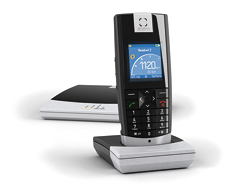snom Goes Mobile
 Mobile VoIP for the enterprise is a lot trickier than many folks had thought. For a while it seemed that voice over WiFi was going to take off, but then the reality in poor audio quality, and poor battery life forced the suspension of many plans pending new devices (that may never come) that can fix this issue. Frankly, WiFi is just too chatty, too demanding on connected devices to enable effective uptime, talktime and standby time.
Mobile VoIP for the enterprise is a lot trickier than many folks had thought. For a while it seemed that voice over WiFi was going to take off, but then the reality in poor audio quality, and poor battery life forced the suspension of many plans pending new devices (that may never come) that can fix this issue. Frankly, WiFi is just too chatty, too demanding on connected devices to enable effective uptime, talktime and standby time.
Despite this disappointment, there is still plenty of innovation occurring to fill the void and capture a portion of this market.
One clever approach, by the IP phone manufacturer, snom , of Berlin Germany is a sure-fire way to get the attention of campus-based enterprises in Europe and Asia. The new m3 IP phone is a DECT phone. Digital Enhanced Cordless Telecommunications was originally developed by the ETSI but has since been globally adopted, including through an FCC decision in 2005, in the USA.
This global phone leverages the well understood voice-only unlicensed wireless infrastructure, to introduce a slick new campus-oriented VoIP-based DECT service. The basestation supports a SIP-stack that terminates the SIP and RTP communications (or secure SIP and RTP), letting DECT do the cordless thing. This technique can deliver an impressive array of features especially excellent talk and standby time:
- Operating time, 10 hours talk / 100 hours standby
- Range min. 50 m indoor, min. 100 m outdoor
- Speakerphone; Half duplex
- Automatic registration of handset to gateway
- Separate charging cradle for handset
- 8 handsets possible at one gateway
- 6 alerting handsets at a time
- 8 SIP registrations with different SIP servers/registrars
- 3 concurrent VoIP Calls (SIP 2.0 – RFC3261)
- Conferencing (2 handsets + 1 VoIP) + (1 handset + 2 VoIP); One conference at a time.
- Easy configuration of the phone, remote configuration
This is the fourth unit in the snom portfolio for VoIP phones. The other innovation we discussed with Michael Kneiling, CEO and Mike Storella, the Director of Business Development was the 370, a SIP-compliant VoIP phone with built in VPN client.
This makes the 370 ideal for home worker deployments and even nomadic users who setup of their office for a few hours in a hotel room or a client office. In these circumstances, the home network doesn't have to worry about configuring Session Border Controllers but instead can create an IP tunnel inside which the SIP and RTP packet flows can pass securely. I like this approach a lot since it avoids extra appliances normally required at one or both ends of the communications flow.
This post has already been read 0 times!
Edit
